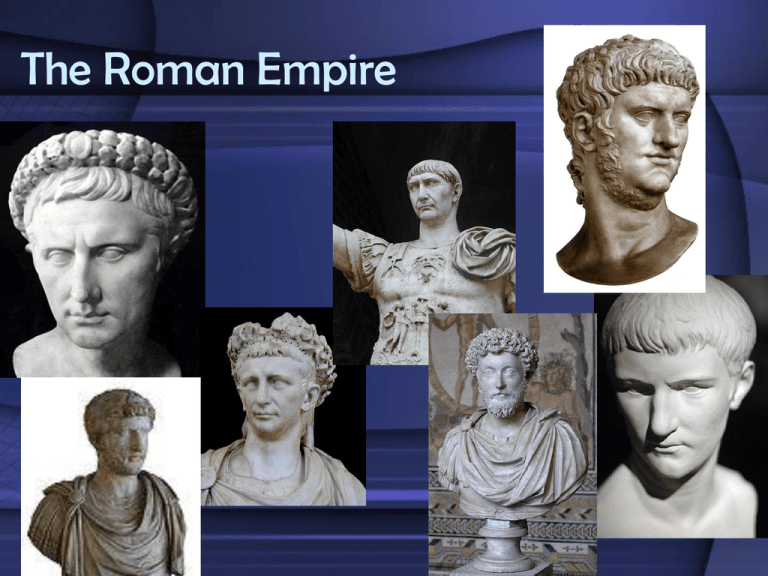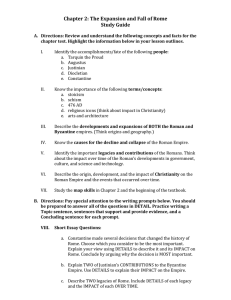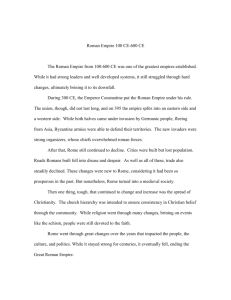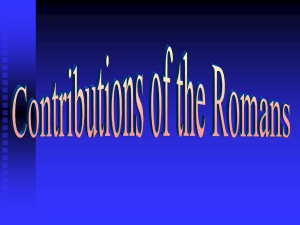The Roman Empire
advertisement

The Roman Empire Today’s Goal: • Explain the reasons for the fall of the Roman Empire and its legacies. Crises in Rome – the End of the Pax Romana • Disruption of trade – Invaders, pirates threatened travel • Lacked gold/silver – Rome no longer expanding • Meager harvests – Overworked soil, destroyed farmland • Decline of military – Mercenaries – Christianity did not encourage war • Loss of patriotism – Lack of Roman unity, poor conditions Effects of Crises • Coined more $ to fight economic downturn – Caused inflation instead (loss in value of $ along with higher prices) • Food shortages led to decline in population (less soldiers) • Diseases spread • Gov’t raised taxes Emperor Diocletian • How to fix army? – Doubled size of Roman army • How to fix inflation? – Set fixed prices for goods • How to give more prestige to Emperor? – Claimed to descend from the gods, ceremonies for himself • How to control the size and complexity of the empire? – Divided empire into east (Greek-speaking) and west (Latin-Speaking) Constantine • Disorder after death of Diocletian • Constantine (same guy who converted to Christianity & made it approved in the Edict of Milan) unified Empire again – Moved capital from Rome to Byzantium in east – Location was key for trade & defense – City changed name to Constantinople • Imperial buildings similar to Rome • Massive walls After Constantine • Empire divided into east and west again • Invasions by Barbarians – Germanic peoples were pushed into Roman lands – Huns (Attila the Hun) • Powerful chieftain, attacked and plundered Roman cities • Could have conquered Rome, but failed due to famine & disease • Last emperor = Romulus Augustulus – Ousted by German forces • Eastern empire becomes Byzantine Empire • Western empire crumbles & divides Legacies of Rome • Greco-Roman Culture – Classical – Mixture of Greek, Hellenistic, & Roman – Used Greek language, architecture, philosophy – Adapted, combined, and created new styles from Greek & Hellenistic • Used Roman art & literature to convey Roman values of strength, permanence, solidarity (gravitas!) Legacies of Rome • Roman art for practical purposes – Public education! – Sculpture – Bas-relief (images project from flat background) – Mosaics (pictures made from tiles) Legacies of Rome • Latin was key for later culture – Official language of Roman Catholic Church – Adopted by different peoples, became French, Spanish, Portuguese, Italian, Romanian (Romance languages) – More than ½ of English words have Latin basis Eureka! Accio: Latin "I summon." Legacies of Rome • LAWS!!! – Equal treatment – Innocent until proven guilty • Accuser has burden of proving guilt – Punished only for actions, not thoughts – No unfair, unreasonable laws Legacies of Rome • Technologies/advancements – Aqueducts (clean water to cities) – Baths – Coliseum (use of arches) – Dome (i.e. Pantheon)






